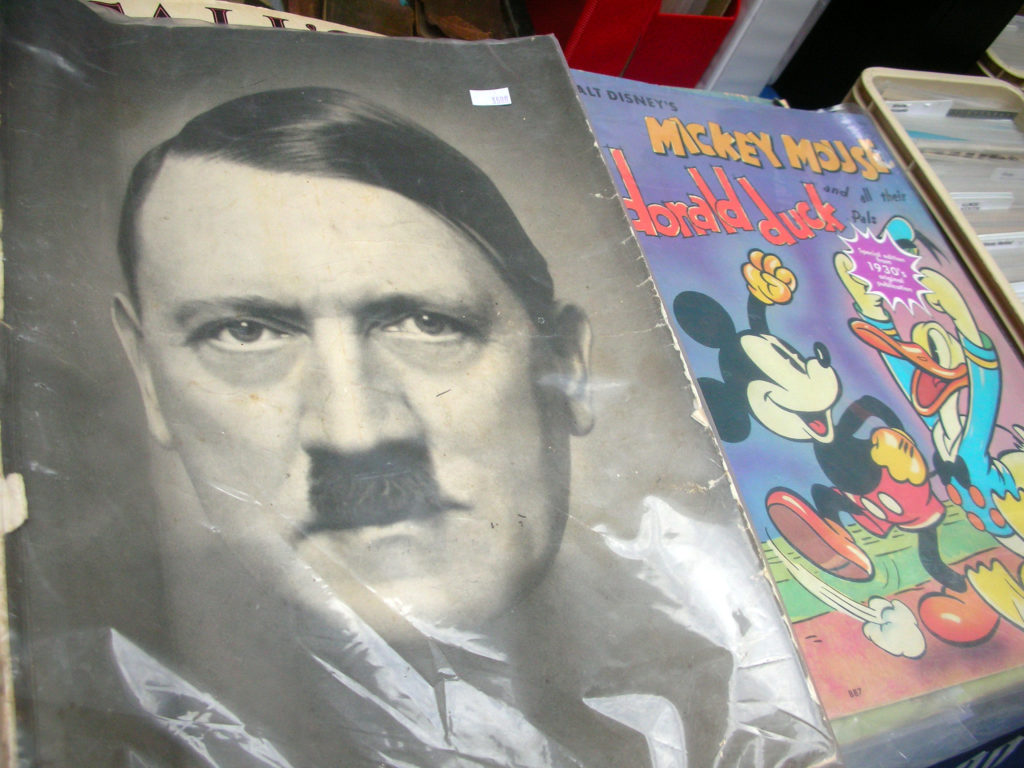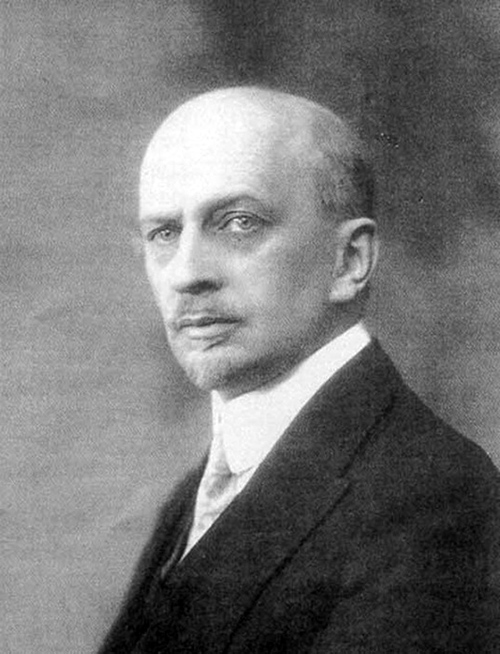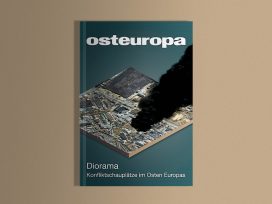Reading your book Black Earth and your article on Ivan Ilyin, what struck me was a very close and attentive reading of Adolf Hitler’s Mein Kampf and Ivan Ilyin’s writings. You treat their ideas very seriously. It’s especially unusual with regards to Hitler, whose Mein Kampf is not extensively studied among historians – most of them concentrate almost exclusively on his actions, but not his thinking. In my view, the seriousness with which you take ideas makes your scholarship as a historian exceptional and refreshing. Henry Kissinger noted this by claiming that Black Earth is partly a book of history, and partly a book of political theory. What is your take on the relationship between ideas and actions, words and deeds?
First of all, there’s a danger in separating intellectual and political history, where intellectual historians are concerned with ideas that are interesting, and political historians are not concerned with ideas at all. Often ideas that are most significant are bad ideas, i.e. ideas that are not interesting in and of themselves, but nevertheless exert psychological, sociological, and political power. And we don’t have to go all the way back to Hitler to see an example of this. In our own societies, we know perfectly well at least a few ideas that are significant, although they may not be good ideas. An intellectual historian 80 years from now may not be concerned with them, but they are nevertheless powerful.
That said, to understand Mein Kampf I think you have to have a certain amount of intellectual history background to realize how Hitler is working from Biblical traditions, from traditions of Victorian science, Darwinism etc. Not so much because he needs to be classified as a thinker, but in order to see and comprehend how Mein Kampf makes sense, how it holds together.

Photo: barthjg. Source: Flickr
You’re right, it is very unusual to spend as much time on Mein Kampf as I do at the beginning of Black Earth. I put it at the beginning of my book because Black Earth is a book about the Holocaust of the Jews, and the history of the Holocaust of the Jews has to be understood as a realization of a particular worldview. The worldview, a vision of the world without Jews, is stated in Mein Kampf, and is realized in the history of Germany and also in the history of German actions towards states and societies beyond Germany. I don’t think you can understand the Holocaust without analysing the worldview.
There are many ways you can make this argument. One is the classical question of the different forms of extermination policies applied to Jews and Slavs. If one ignores the ideology one easily falls into questions of comparison rather than questions of origins. The difference between how Germany treats the Slavs and how it treats the Jews is ideological – it goes back to the difference between colonizing the Slavs and a world without the Jews. You can have massively murderous policies towards both groups of people, but at the end of the day there is a difference, and the difference is ideological. Slavs were to be colonized and Jews were to be removed from the planet because Slavs were seen as an inferior race whereas Jews were seen as a non-race that prevented the racial struggle from getting underway.
Or, in a case of my own central argument, I am saying that the Holocaust happened because of a certain kind of politically generated anarchy, in the course of which German power was used to get rid of traditional political institutions, and that created an environment that made mass killing in these stateless zones possible. It is easier for me to see that when I read Mein Kampf and realize that Hitler is not a German nationalist, that he is not a state-builder. Instead, he is someone who is trying to restore the world to its natural condition of being which is precisely a competition among races. Competition among races is not a political-institutional idea, it’s some other kind of idea. And so then it’s easier to see the German campaign in the East with its destruction of institutions as a normal part of the destructive process. If you ignore the ideas and start from the premise that it’s all about institutions and what institutions do, you cannot understand the destruction of other institutions as part of the argument.
What about Ivan Ilyin and his ideas? Despite the fact that Vladimir Putin has brought Ilyin’s ideas into high politics and justified his foreign policy quoting Ilyin’s writings, Western observers are yet to discover this author. You, on the other hand, have read a lot of him lately and have written about him. Why are you taking Ilyin’s writings so seriously?
I’m trying to show respect. Not moral respect necessarily, but intellectual respect. It’s so very easy to just dismiss certain kinds of ideas, it is so terribly easy. It’s so easy to dismiss Ilyin from a Western moral and intellectual consensus. The CIA wrote a paper about Ilyin and dismissed him in snide terms because he wrote badly. Actually, he’s not such a bad writer, he’s actually quite good. You can dismiss him by saying ‘He’s a hundred years old’, or if you’re liberal you can say ‘He’s just wrong about the individual’. There are so many ways to just push someone off the table.
But if someone is in fact influential, how do you judge the influence? One way to do so is to figure out how ideas work. It’s not the only way, but it’s one of the ways. Since I have the tools to do so – I read the languages and have some understanding of the intellectual environment – I think it’s worthwhile.
But since Ilyin is probably the most important political thinker in today’s Russia I also do it in this particular case as a kind of reflective activity for Russians. Just as it is easy to dismiss thinkers who are operating in different intellectual traditions, it’s also easy to accept them or parts of them without seeing how the whole thought works. Maybe I’m naïve, but I would like to think that if Russians realized just how deeply in right-wing totalitarianism Ilyin was rooted, they might hesitate about making him their state-philosopher.
Your argument in Black Earth is that anti-Semitism alone is insufficient to explain the Holocaust, that it is impossible to explain it without analysing the very specific politics of the region. The conclusion that you draw is that the loss of sovereignty, rule of law and citizenship is a crucial factor in understanding the Holocaust. Why was sovereignty and rule of law so important?
Let me start historiographically. Usually, the history of the Holocaust (and of everything else) is written as a national history. When you’re inside the national history, you can’t see the rule of law and citizenship as general ideas. In the best case, you can see citizenship as citizenship in a nation. Hannah Arendt argues that Jews could be killed only when they were separated from states. And she’s right. But what she doesn’t see, because basically she is looking at it from within a German experience, is that you can separate Jews from states by getting rid of the states. So historiographically, our story is narrated from a German or German-Jewish perspective, and this story is about corruption and disintegration of law inside Germany. Whereas, as I see it, if Arendt is right in principle (and she is), the full story of the Holocaust should reveal how the rule of law as such is removed in a large swath of Europe.
Practically speaking, if Jews are citizens of a state, it is much harder to kill them. It turns out to be true for Germany, and it’s also true of other anti-Semitic regimes in Eastern Europe. It’s possible to oppress them, but insofar as there is rule of law, you have to do tiresome things like passing the laws and trying to implement them. In practice, what really happens is that Germany is able to kill Jews on a large scale once it invades other countries and declares that their legal systems no longer exist. This operates in a lot of ways. One is that the Germans themselves believe that they are operating in some kind of special zone. Another is that at the local level, if basic laws such as property law no longer function, then stealing from Jews is no longer theft. It creates a different kind of political setting, a setting in which an overall anti-Semitic idea can be implemented.
It relates back to anti-Semitism in a specific way. You can ask: isn’t it true that anti-Semites in Poland were more likely to kill Jews than other people? Perhaps. But the killing on the scale of thousands only begins in a wartime society where the law is absent. It certainly might be true that in Jedwabne – and I’m willing to believe it’s true – the murderers were more anti-Semitic than non-murderers. But they weren’t murderers in 1938, they weren’t murderers without the specific conditions of the destruction of rule of law. In other words, even if you think anti-Semitism is a cause, precisely if you do think it is a cause, you need to consider other causes that explain why more Jews were murdered in 1942 than in all the pogroms in the history of the world.
Another way of seeing the significance of institutions is to understand that all of the killing policies – starvation of prisoners of war and ‘retributions’ against civilians – work themselves out in the zone where Hitler declared that the states didn’t exist. Anti-Semitism was not an immediate cause of the death three million prisoners of war, but state destruction was. Of course, that point can be turned around in an interesting way. It is important, and I should have said this at the beginning, that Hitler’s very special form of anti-Semitism was a precondition for the Holocaust. But without his anti-Semitism he would not have conceived of a war against the Soviet Union as he did, as a war of extermination. So in that indirect way the other killing policies have something to do with anti-Semitism.
The perspective of national history is deeply entangled with issues of memory. For many people who live and whose parents or grandparents suffered immeasurably in the ‘bloodlands’, it is still difficult to view the Holocaust as a transnational phenomenon. For many, it is very convenient to symbolically locate the Holocaust in Auschwitz rather than in the nameless shooting pits in the Eastern Europe. It seems that memory is something that inhibits our ability to learn from history. Is there a way to reconcile history and memory, especially with regards to such painful experiences as the Holocaust, Nazism and Communism?
One of the things that was very reassuring for me when I wrote Bloodlands, which was pretty much in every setting (especially an American setting) an unusual and unexpected book, was that I got all those emails from Jews of east European heritage who said things like: ‘My father has been trying to explain to me why my grandfather was murdered in Belarus, and now I understand.’ For an American Jew who knew that his life had something to do with the Holocaust, what he heard from his family had no connection to what he saw in popular movies or even what he read in a couple of books. There was no connection between these accounts. So that heartened me a lot, that the book helped people make sense of their family memories.
On the other side of things, if you’re in Belarus, Ukraine, Lithuania, Poland or Russia, if the history of the Holocaust is understood to be synonymous with Auschwitz, then there is no particular reason for a national conversation about collaboration, because the local mass murder of Jews is not classified as the Holocaust, it was something else, for example, defending Lithuania or fighting collaborators, but it wasn’t the Holocaust because the Holocaust is located in Auschwitz. In a strange way nationalist self-exculpation works together with the common Western simplification of the Holocaust.
As to the reconciling of history and memory, this is something that preoccupies me a lot. I am very much in favour of memory in the sense of people recording what they experienced, local archives, video testimonies and so on. All this is wonderful and necessary. Without it, we simply cannot do the history of the Holocaust as it must be done. Individuals and their voices are absolutely crucial in these stories. In that sense memory is very important.
Yet memory, the word is often used, can mean the concepts applied to the past that are most convenient in the arbitrary moment of the present. What I see the job of a historian to do, or what history does, is providing a check on politicized memory. Historians should not oppose what everyone thinks, but they also should not be trying to agree with what everyone thinks. Historians should be working in a different way with their own methods in order to check memory, to force it to correct itself, to go back to those sources that were ignored the first time around.
History without memory is impossible, but memory without history is dangerous.
I am tempted to interpret the publication of Black Earth as a timely intervention in the ongoing debate in contemporary political philosophy between globalism and localism, national and supranational. Since your argument is built on historical, factual, and not purely theoretical foundations, I think it gives it additional substance and poignancy. Would you agree that the nation-state is still the most basic and most important political unit in our world?
We can’t do without the state. The efforts to intellectually abolish the state, moving to a higher level of geographical abstraction, are doomed. Moving to the global level of analysis without bringing the state along with you is actually not just wrong but dangerous. Dangerous in a way that the old-fashioned Left would have understood. Because moving to the global level without bringing the state with you, you’re saying: ‘Look how interesting that ideas and cultures are moving around’, and what you’re missing is ‘Oh look how interesting that trillions of dollars are now in offshore accounts where states can’t get to them.’ The idea that you can locate wealth in places that states cannot reach is, frankly, the most important issue in our contemporary political life. Offshoring the money is the dark side of globalization. Sure, it’s nice that we can share ideas globally, but the fact of erosion of state authority on a global level is something that has to be taken into account very seriously.
It’s not that I’m particularly in love with the nation, and I would prefer to speak about states rather than nation-states, because I don’t think that, for example, Switzerland is a nation-state, and I don’t think that America is a nation-state either. But I think that what you need are political institutions that are appropriate to certain scales. The state is appropriate to a certain scale of territory, but also appropriate to a certain scale of identity. I think it’s perfectly normal in the existing historical conditions that many people would identify with something like a nation or some bigger culture, maybe Europe, maybe the world.
I don’t think that the state is sufficient unto itself. Rather, it is a crucial mediator for many other things. It is a left-wing fantasy to imagine that you can have Europe without states, but it is also a right-wing fantasy to believe that you can have states without Europe. Each of them has certain functions at certain scales. There is no antinomy between them, they actually work together.
What do you think about the antagonism between ‘Brussels’ and nation-states that has become a dogma in the right-wing populist rhetoric? Would you agree that the European Union actually strengthens the sovereignty of EU member states, especially the smaller ones?
I think that’s exactly right. There are many ways that you can make this case. One of them is just naked history. Especially relevant is the first half of the twentieth century. Some basic historical knowledge of this period would be more than welcome in current political debates. The Lithuanian state was destroyed in 1940 not because of bureaucrats from Brussels. It was destroyed in 1940 because there was no European system which could overcome the logic of power of individual states. The end of Lithuania is part of the same story as the end of Latvia, Estonia, Czechoslovakia, Austria and Poland. If there isn’t a European system which enforces the basic norms such as territorial sovereignty, if there isn’t an institution that provides thickness to such ideas as law, then countries such as Lithuania are doomed. An independent Lithuania that you have now has lasted longer than the interwar Lithuania, and there’s a reason for that. And the reason for that is that there’s a web of international institutions that makes law harder to break. That means that if someone has the idea of invading Lithuania (which of course people do from time to time), there are other things that they need to think about.
That’s just one way, a brute historical way, of arguing for the European system. But there’s another way, which is the actual functionality of the state. Not just Lithuania but also big states like Great Britain are more functional because of Europe, because Europe can do things that they alone cannot. For example, administering a large trade zone. Small states are in no position to do that. Several states may cooperate, of course, but if you want to have a big trade zone, then you need to have something like the EU. Lithuania cannot do that by itself.
On the other side, if you don’t want to become a plaything of international markets, you cannot resist it simply as Lithuania. You cannot do that even as America, but you certainly cannot do that as Lithuania. You have to have something big. And that big thing is what preserves your sovereignty, in the sense of some state capacity to choose how a population touches international markets and how it does not. If you’re Lithuania, the chance that you can resist Chinese capital on your own is zero. Even in America we have trouble with this. The only way to have some kind of layer which makes it possible to administer local politics is by way of the European Union.
So historically, functionally, and in terms of protection, the European Union is something that makes Lithuanian sovereignty possible. But it’s a much wider problem, it’s not confined to Lithuania, you may come across it in France, in Great Britain and other countries. As I see it, the political problem boils down to a certain mythology of history. The mythology of history works something like this: there was always a nation, and the nation chose. The British and the French often say: we chose Europe. No, they didn’t choose Europe. They didn’t choose to lose their empires. They just lost them, and then found something else. Great Britain didn’t choose to lose India, France didn’t choose to lose all those wars in Indonesia and Africa. They didn’t choose Europe: Europe was there for them as they returned from the world. Similarly, it’s not true that Hungary, Poland or Lithuania chose Europe after 1990 or 1991. Europe was there for you. The notion of not being part of Europe would at the time have seemed simply absurd. It is only in retrospect, with the help of forgetting, that a national history of a nation-state with such choices is imagined. This is not a theoretical point: getting history wrong can mean you think you are walking across a friendly meadow when in fact you are at the edge of an abyss.
What I worry about is that when Europeans teach themselves that there is a nation that goes through history, it creates this false option: ‘Oh, we could be part of Europe or we could decide to opt out’. ‘Not being a part of Europe’ is one of those myths for children. It’s not actually history.
In Poland, the government is trying to portray the Poles as a nation of victims, change the contents of Gdansk’s WWII museum, wants to strip Jan Gross of the Order of Merit. In Hungary, Viktor Orbán calls Horthy ‘an exceptional statesman’ and evokes anti-Semitic imagery in his anti-Soros campaign. What is your take on recent developments in the politics of history in Central and Eastern Europe?
There is a moral and a political critique. The moral critique is simpler. The people in positions of responsibility need to be better rather than worse compared to their populations. The political critique is more complicated, but probably more important. The portrayal of the nation as victim is an anti-state rather than pro-state position. If you raise people to think that they’re victims, then you’re not raising them to think that their nation or their state has an active part to play in, for example, Europe. If you’re raised to think that you’re always a victim, you can define your position in the European Union as that of a victim, which means that you weaken the larger institutions.
It may also mean that you just don’t correctly perceive the balance of threats and get seduced by the people who flatter your sense of victimhood rather than listening to the people who value your sovereignty. In Poland today, if you read the right-wing popular press, which I do, there is much more discourse about the German threat than about the Russian threat. You might have thought, given the fact that Russia has just invaded a neighbouring country, that this would be the other way around.
What about Viktor Orbán’s embrace of Miklós Horthy? Why is there such an increasingly widespread trend to go back to the darkest chapters of the twentieth century and resurrect heroes among the worst of this dark historical period? Why is it happening at this precise moment?
There is a global trend of going back to the 1930s. Russia’s official rehabilitation of Ivan Ilyin is precisely going back to the 1930s, more precisely, to the European fascism of the 1930s. Trump and Bannon’s idea of ‘America First’ is technically from 1940, but it is meant as nostalgia for the period before America entered the world in the WWII and before the welfare state. The ‘America First’ movement included many populists and white supremacists. ‘Brexiteers’ and France’s Front National depend upon the notions of Britain and France as nation-states before WWII, despite the fact that these notions have no historical justification, as we’ve already discussed.
Poland has a similar problem. There’s an idealization of the inter-war state without any contemplation about the problems that the inter-war state created or did not manage to solve. The odd way that it works is that everyone says: ‘We were fine in the 1930s, but during the Second World War other people did bad things to us.’ It is understandable that the cataclysm of the Second World War, and the extraordinary scale of the suffering of Polish citizens, tends to block out the previous period. But for those who wish to build the Polish state, especially those who think that they are continuing the traditions of the 1930s, a more thorough study of the period would be rewarding.
It is really difficult to explain these strange and dangerous tendencies. Part of the problem is generational. Almost no one who remembers the 1930s is with us any more. Part of it has to do with the lack of European history as such. If you go back to the 1930s and interpret it in a comprehensive way, you realize that there is a systemic failure. Whereas if you look at it just from the perspective of your own nation, you can say: ‘I can rationalize my own fascism (or authoritarianism, or Stalinism).’ If we would put more effort in cultivating a comprehensive European perspective, more people would likely begin to appreciate that the problem of 1930s was systemic. In that case, glorification of people like Horthy would not make any sense.
It seems that nationalists leave you with only two options: either you glorify all heroes of a certain period, or you denigrate them all. No nuanced middle position is allowed. I would like to touch upon a very recent example of this. A few months ago, an intense information battle erupted between Russia and Lithuania, when the Russian Ministry of Foreign Affairs reacted angrily to a video made by NATO about anti-Soviet resistance fighters in the Baltics. Russia tries hard to discredit the essence of the partisan movement by referring to individual partisans who had previously been Nazi collaborators or participated in the Holocaust. What would be your advice to Lithuanian civil society and diplomats in such a situation? It seems to me that you need a delicate balancing act: on the one hand, you should be sincere about your nation’s past and openly confront the dark side of history, yet on the other hand, it does not seem productive to actively engage in public historical debates in the context of aggressive propaganda.
I think that the only response is to say: ‘We are critically investigating our own history’, and give examples. This is not as satisfying in the short run as information war, but it is more responsible and in the long term builds a better society. Imitating Russian information war means becoming Russia. And in a sense this is also impractical, because what Russia is doing with memory it would be difficult for anyone else to do. What Russia does is export responsibility. The Germans have their own pattern of investigating history, and sometimes they have a certain tendency to say: ‘Everyone should follow our pattern.’ That’s annoying, but you have to give Germans real credit because they have actually delivered and they continue to be reflective about much of their history. But what the Russians are doing is exporting the entire problem of being critical about one’s own history.
From the Russian perspective, the situation looks like this: Lithuanians have to investigate their collaboration, and Ukrainians have to investigate their collaboration, but Russians don’t. It’s as though Russia is fulfilling its duty by telling the world about Lithuanians and Ukrainians, whereas, of course, there were very important Russian collaborators, and by the numbers there were more Russians alongside the Wehrmacht than any other Soviet nationality. Russians were no more and no less likely to collaborate in the Holocaust than other Soviet citizens. Just to be clear about my own moral position, which I borrowed from Jerzy Jedlicki a long time ago: if you wish to celebrate the nation, that means that you also take responsibility for the darker parts of its past. Russia has perfected the opposite: celebrating the nation by imagining that the darker parts of its past can be exported.
It’s perfectly proper to investigate individuals and to figure out stories. What Ukrainians think of the UPA (Ukrainian Insurgent Army), or what any nation thinks about wartime or postwar partisan movements should ultimately result from their own serious investigations. But the deep problem with what Russia is doing is that it’s not interrogating its own history at all, instead passing a burden of doing it to someone else. I find this type of discourse deeply disturbing, because it spreads very quickly, and Lithuanians or Poles will then get excessively defensive and claim that they did what they did ‘because of the Jews’, thus exporting responsibility even further.
More than once in recent years, you have brought attention to the fact that Vladimir Putin effectively rehabilitated the Ribbentrop-Molotov pact after the annexation of Crimea. Why is that important?
There are two sides to the Russian approach to the Ribbentrop-Molotov pact. The first side is the public Kremlin position that it was brilliant diplomacy, that it was the only thing that could have been done at the time. The logic behind this claim is to export responsibility back to history, by saying: ‘Everybody was doing it, there was nothing special about it.’ From this perspective, the specifics get lost. Yes, many states were cooperating with Nazi Germany in the 1930s, but the Soviet Union was the only state that was willing to enter into something like an offensive military alliance with Nazi Germany in 1939. The Soviet Union was the one who was willing to start the Second World War as a German ally. The Soviet Union was willing to invade Poland. The Soviet Union was the one who was willing to destroy states along with Nazi Germany, thereby creating some of the conditions of the Holocaust.
When you say that the Ribbentrop-Molotov pact was nothing special because everybody was doing such things, you effectively claim that there was nothing specific about it.
My interpretation of the rehabilitation of Ribbentrop-Molotov pact is related to current Russian policy to the EU. When Stalin was pondering over the alliance with Hitler, he was thinking: ‘I’m going to make an alliance with the extreme Right and it will hasten the destruction of Europe. Because Germany is going to invade France, Europe will fall and we will pick up the pieces.’ I cannot help but see a similar strategy at work in Putin’s playbook. You forge alliances with the Le Pens and Farrages of the world (and with people who are much further to the right), and the logic is that this will hasten the demise of Europe and we will pick up the pieces. That might just be a coincidence, yet I cannot help but see a resemblance. I had this in mind when I predicted in May 2014 that Putin would rehabilitate the Molotov-Ribbentrop pact, as he in fact did in September 2015.
Of course, in contemporary Russia only President Putin and his ministers are allowed to interpret the Molotov-Ribbentrop pact, or even really talk about it. As a Russian citizen, if you say that the Second World War began when the Nazi Germany together with the Soviet Union invaded and partitioned Poland, you can be convicted of crime, which has now happened.








